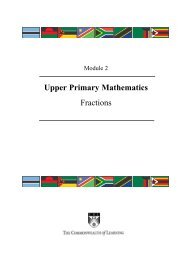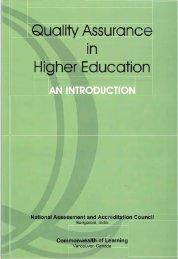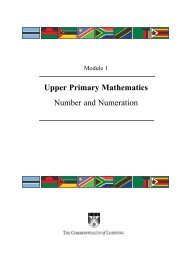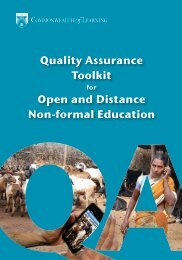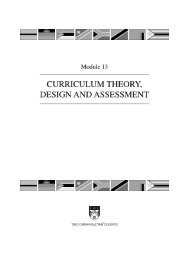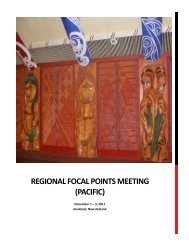Tech-MODE for Agricultural Education and Improved Livelihoods in ...
Tech-MODE for Agricultural Education and Improved Livelihoods in ...
Tech-MODE for Agricultural Education and Improved Livelihoods in ...
Create successful ePaper yourself
Turn your PDF publications into a flip-book with our unique Google optimized e-Paper software.
STAKES AND CHALLENGES FOR TECH-<strong>MODE</strong> IN AGRICULTURAL EDUCATION IN CAMEROON<br />
For reasons of educational culture <strong>and</strong> adm<strong>in</strong>istrative tradition, none of the<br />
agricultural educational <strong>in</strong>stitutions is considered higher education <strong>in</strong>stitutions <strong>in</strong><br />
Cameroon. Three reasons account <strong>for</strong> this. First, the m<strong>in</strong>imum entry qualification<br />
<strong>in</strong>to the schools are not GCE Advanced Level or equivalent levels. Second, the<br />
organizational structure of the schools does not correspond to higher education<br />
nomenclature. Third, the <strong>in</strong>stitutions are under the control of supervisory<br />
M<strong>in</strong>istries <strong>and</strong> not under the control of the M<strong>in</strong>istry of Higher <strong>Education</strong>.<br />
The issues at stake are quality assurance <strong>and</strong> accreditation. It is argued that unless<br />
these schools are subjected to the rigour <strong>and</strong> culture of university education on<br />
these two scores at a m<strong>in</strong>imum, they do not qualify as higher education <strong>in</strong>stitutions.<br />
Higher education <strong>in</strong>stitutions<br />
Of Cameroon’s six public universities, the University of Dschang (UD) is the only<br />
<strong>in</strong>stitution of higher learn<strong>in</strong>g with a clear m<strong>and</strong>ate <strong>for</strong> higher education <strong>and</strong> tra<strong>in</strong><strong>in</strong>g<br />
<strong>in</strong> agriculture. However, the University of Ngaoundere is also m<strong>and</strong>ated by official<br />
government policy (MINESUP, 1993) to offer tra<strong>in</strong><strong>in</strong>g <strong>in</strong> the process<strong>in</strong>g of animal<br />
by-products (milk, butter, cheese <strong>and</strong> yogurt). Ngaoundere is also ventur<strong>in</strong>g <strong>in</strong>to<br />
beer <strong>and</strong> w<strong>in</strong>e research purely <strong>for</strong> educational purposes. All tra<strong>in</strong><strong>in</strong>g at the University<br />
of Ngaoundere is by residential mode (face-to-face).<br />
9 Distance education <strong>in</strong> higher education<br />
The University of Dschang (UD) “is a pioneer <strong>and</strong> rema<strong>in</strong>s Cameroon’s best<br />
<strong>in</strong>stitution of higher learn<strong>in</strong>g <strong>in</strong> agricultural education <strong>and</strong> tra<strong>in</strong><strong>in</strong>g…committed to<br />
excellence <strong>in</strong> agricultural teach<strong>in</strong>g, research <strong>and</strong> outreach” (University of Dschang,<br />
1996:1)<br />
Distance education at UD started with a visit by an official from Dschang to the<br />
University of Guelph (UoG) <strong>in</strong> 1988. Between 1989 <strong>and</strong> 1990, teams from UD <strong>and</strong><br />
UoG jo<strong>in</strong>tly wrote a proposal that was submitted to the Canadian International<br />
Development Agency (CIDA) <strong>for</strong> fund<strong>in</strong>g. The proposal “to establish a susta<strong>in</strong>able<br />
distance education project to tra<strong>in</strong> Cameroonians <strong>for</strong> a diploma <strong>in</strong> tropical agriculture”<br />
was approved <strong>for</strong> fund<strong>in</strong>g <strong>in</strong> April 1991 (University of Dschang, 1998).<br />
This <strong>in</strong>itiative evolved from a project to a programme <strong>in</strong> the Faculty of Agriculture<br />
<strong>and</strong> <strong>in</strong>stitutionalized as a programme at the University of Dschang subsequently<br />
(Nji, 1999). The Programme consists of 20 agricultural tra<strong>in</strong><strong>in</strong>g courses <strong>in</strong> both<br />
English <strong>and</strong> French written, produced <strong>and</strong> delivered <strong>in</strong> Dschang by a team of faculty<br />
tra<strong>in</strong>ed <strong>in</strong> distance education methodology both <strong>in</strong> Guelph <strong>and</strong> <strong>in</strong> Cameroon between<br />
1992 <strong>and</strong> 1996. Three options were on offer: Crop production, Animal Production<br />
<strong>and</strong> <strong>Agricultural</strong> Management. Further details of this programme are as follows.<br />
Registration<br />
Enrolment <strong>in</strong>to the programme is open to anyone who is <strong>in</strong>terested <strong>in</strong> study<strong>in</strong>g<br />
agriculture. There are no m<strong>in</strong>imum educational requirements, age limits or<br />
TECH-<strong>MODE</strong> FOR AGRICULTURAL EDUCATION AND IMPROVED LIVELIHOODS IN SUB-SAHARAN AFRICA: COUNTRY CASE STUDIES ■ 33



